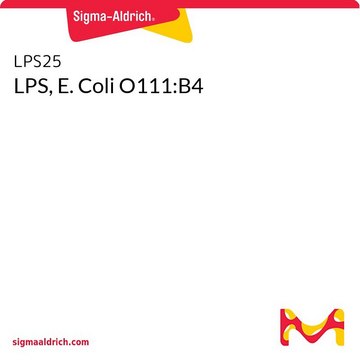L9143
Lipopolysaccharides from Pseudomonas aeruginosa 10
purified by phenol extraction
Sinónimos:
LPS
Iniciar sesiónpara Ver la Fijación de precios por contrato y de la organización
About This Item
Productos recomendados
biological source
Pseudomonas aeruginosa (10)
Quality Level
form
lyophilized powder
purified by
phenol extraction
impurities
<3% Protein (Lowry)
color
white to faint yellow
solubility
water: 4.90-5.10 mg/mL, faintly hazy to hazy, colorless to faintly yellow
shipped in
ambient
storage temp.
2-8°C
¿Está buscando productos similares? Visita Guía de comparación de productos
General description
This product is phenol extracted from Pseudomonas aeruginosa serotype 10.22 The source strain is ATCC 27316.
Application
Lipopolysaccharides (LPSs) are characteristic components of the cell wall of Gram-negative bacteria. LPS and its lipid A moiety stimulate cells of the innate immune system by the Toll-like receptor 4 (TLR4), a member of the Toll-like receptor protein family, which recognizes common pathogen-associated molecular-patterns (PAMPs).
Biochem/physiol Actions
Lipopolysaccharides (LPS) are localized in the outer layer of the membrane and are, in noncapsulated strains, exposed on the cell surface. They contribute to the integrity of the outer membrane, and protect the cell against the action of bile salts and lipophilic antibiotics.
Preparation Note
The product is soluble in water (5 mg/ml) or cell culture medium (1 mg/ml) yielding a hazy, faint yellow solution. A more concentrated, though still hazy, solution (20 mg/ml) has been achieved in aqueous saline after vortexing and warming to 70-80 oC. Lipopolysaccharides are molecules that form micelles in every solvent. Hazy solutions are observed in water and phosphate buffered saline. Organic solvents do not give clearer solutions. Methanol yields a turbid suspension with floaters, while water yields a homogeneously hazy solution.
Other Notes
To gain a comprehensive understanding of our extensive range of Lipopolysaccharides for your research, we encourage you to visit our Carbohydrates Category page.
Related product
Referencia del producto
Descripción
Precios
Storage Class
11 - Combustible Solids
wgk_germany
WGK 3
flash_point_f
Not applicable
flash_point_c
Not applicable
ppe
Eyeshields, Gloves, type N95 (US)
Elija entre una de las versiones más recientes:
¿Ya tiene este producto?
Encuentre la documentación para los productos que ha comprado recientemente en la Biblioteca de documentos.
Los clientes también vieron
Keiko Yamauchi et al.
International journal of biological sciences, 5(7), 667-678 (2009-11-07)
Azithromycin (AZM), a 15-member macrolide antibiotic, possesses anti-inflammatory activity. Macrophages are important in innate and acquired immunity, and produce pro-inflammatory cytokines such as interleukin (IL)-12, which are composed of subunit p40 and p35. The key function of IL-12 is the
Khaled Taha-Abdelaziz et al.
Veterinary research, 47, 44-44 (2016-03-19)
β-defensins are an important element of the mucosal innate immune response against bacterial pathogens. Tracheal antimicrobial peptide (TAP) has microbicidal activity against the bacteria that cause bovine respiratory disease, and its expression in tracheal epithelial cells is upregulated by bacterial
Sudarshan Singh Rathore et al.
Scientific reports, 7(1), 15400-15400 (2017-11-15)
Cryptococcus neoformans infection is quite complex with both host-pathogen interaction and host immune profile determining disease progress and therapeutic outcome. Hence in the present study, the potential utility of (E)-5-benzylidenedihydrofuran-2(3 H)-one (compound-6) was explored as an effective anticryptococcal compound with immunomodulatory
Lesley Berghuis et al.
Veterinary research, 45, 105-105 (2014-10-12)
Bovine respiratory disease is a complex of bacterial and viral infections of economic and welfare importance to the beef industry. Although tracheal antimicrobial peptide (TAP) has microbicidal activity against bacterial pathogens causing bovine respiratory disease, risk factors for bovine respiratory
Kettani-Halabi Mohamed et al.
Plant signaling & behavior, 10(3), e1000160-e1000160 (2015-03-12)
Lipopolysaccharides (LPS) are a component of the outer cell surface of almost all Gram-negative bacteria and play an essential role for bacterial growth and survival. Lipopolysaccharides represent typical microbe-associated molecular pattern (MAMP) molecules and have been reported to induce defense-related
Nuestro equipo de científicos tiene experiencia en todas las áreas de investigación: Ciencias de la vida, Ciencia de los materiales, Síntesis química, Cromatografía, Analítica y muchas otras.
Póngase en contacto con el Servicio técnico



